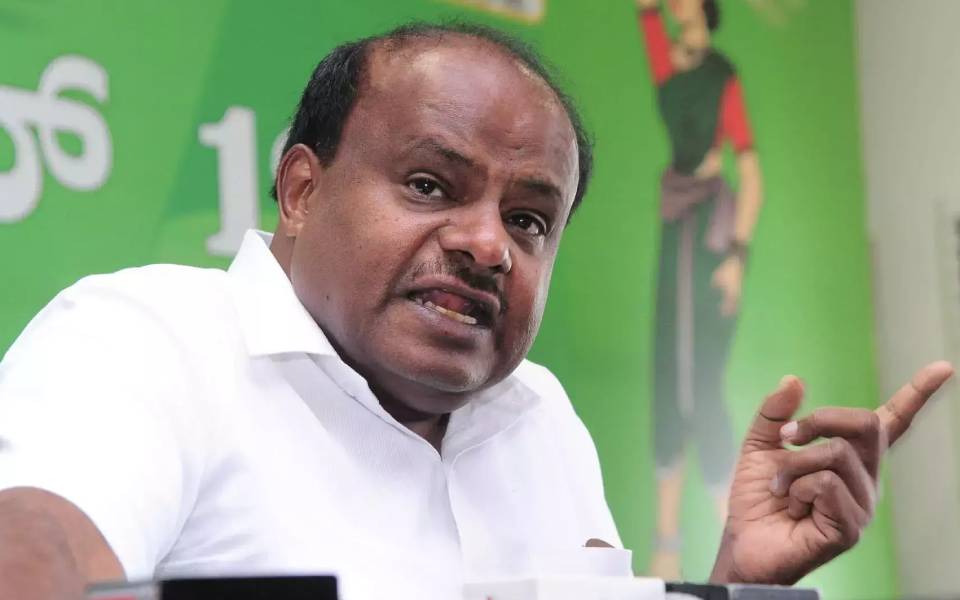Bengaluru, Nov 13: JD(S) state president H D Kumaraswamy on Monday slammed Deputy Chief Minister D K Shivakumar, saying that Karnataka is not his 'republic'.
The former chief minister was reacting to Shivakumar's statement, wondering how the JD(S) leader was related to the five guarantees (pre-poll promises) of the ruling Congress government in the state.
At a press meet on Sunday, Kumaraswamy hit out at Chief Minister Siddaramaiah and Shivakumar for their promises in poll-bound Telangana.
The JD(S) leader had criticised them for giving "tall" promises in the neighbouring state, though they did not address the "lacunae" in the implementation of the five key guarantees in Karnataka.
In his reaction, Shivakumar sought to know "what was the relation" between Kumaraswamy and the five guarantees of the Congress government in the state.
The JD(S) second-in-command in a statement today said, "The 'Duplicate Chief Minister' is quite angry. Extreme anger is dangerous to health. It will be good if he remembers this caution. He has offered the pearls of wisdom 'how is Kumaraswamy related to the guarantees. One talks like this when the bile (arrogance) of power goes to the head and the brain stops functioning".
"This is Karnataka and not the Republic of D K Shivakumar. There is a ruling party and opposition in democracy. People have given me the role of opposition to ask questions," he added.
Kumaraswamy reminded Shivakumar that the wheel of time will bring down those on the top.
The JD(S) state president demanded a white paper on the implementation of five guarantees by the Congress government.
ಡೂಪ್ಲಿಕೇಟ್ ಸಿಎಂ (DCM) ಬಹಳ ಆವೇಶದಲ್ಲಿದ್ದಾರೆ. ಅತಿಯಾದ ಆವೇಶ ಆರೋಗ್ಯಕ್ಕೆ ಹಾನಿಕಾರಕ! ಈ ಎಚ್ಚರಿಕೆ ನೆನಪಿದ್ದರೆ ಕ್ಷೇಮ. ಹೆಚ್.ಡಿ.ಕುಮಾರಸ್ವಾಮಿಗೂ ಗ್ಯಾರಂಟಿಗಳಿಗೂ ಏನು ಸಂಬಂಧ? ಎಂಬ ಆಣಿಮುತ್ತು ಉದುರಿಸಿದ್ದಾರೆ. ಅಧಿಕಾರದ ಪಿತ್ತ ನೆತ್ತಿಗೇರಿ ಮಿದುಳು ಕೆಲಸ ಮಾಡದಿದ್ದರೆ ನಾಲಿಗೆ ಹೀಗೆ ಮಾತನಾಡುತ್ತದೆ. ಅಚ್ಚರಿಯೇನೂ ಇಲ್ಲ.
— ಹೆಚ್.ಡಿ.ಕುಮಾರಸ್ವಾಮಿ | H.D.Kumaraswamy (@hd_kumaraswamy) November 13, 2023
*
ಇದು…
Let the Truth be known. If you read VB and like VB, please be a VB Supporter and Help us deliver the Truth to one and all.
Panaji (PTI): As part of a crackdown against tourist establishments violating laws and safety norms in the aftermath of the Arpora fire tragedy, Goa authorities on Saturday sealed a renowned club at Vagator and revoked the fire department NOC of another club.
Cafe CO2 Goa, located on a cliff overlooking the Arabian Sea at Vagator beach in North Goa, was sealed. The move came two days after Goya Club, also in Vagator, was shut down for alleged violations of rules.
Elsewhere, campaigning for local body polls, AAP leader Arvind Kejriwal said the fire incident at Birch by Romeo Lane nightclub at Arpora, which claimed 25 lives on December 6, happened because the BJP government in the state was corrupt.
An inspection of Cafe CO2 Goa by a state government-appointed team revealed that the establishment, with a seating capacity of 250, did not possess a no-objection certificate (NOC) of the Fire and Emergency Services Department. The club, which sits atop Ozrant Cliff, also did not have structural stability, the team found.
The Fire and Emergency Services on Saturday also revoked the NOC issued to Diaz Pool Club and Bar at Anjuna as the fire extinguishers installed in the establishment were found to be inadequate, said divisional fire officer Shripad Gawas.
A notice was issued to Nitin Wadhwa, the partner of the club, he said in the order.
Campaigning at Chimbel village near Panaji in support of his party's Zilla Panchayat election candidate, Aam Aadmi Party leader Kejriwal said the nightclub fire at Arpora happened because of the "corruption of the Pramod Sawant-led state government."
"Why this fire incident happened? I read in the newspapers that the nightclub had no occupancy certificate, no building licence, no excise licence, no construction licence or trade licence. The entire club was illegal but still it was going on," he said.
"How could it go on? Couldn't Pramod Sawant or anyone else see it? I was told that hafta (bribe) was being paid," the former Delhi chief minister said.
A person can not work without bribing officials in the coastal state, Kejriwal said, alleging that officers, MLAs and even ministers are accepting bribes.





